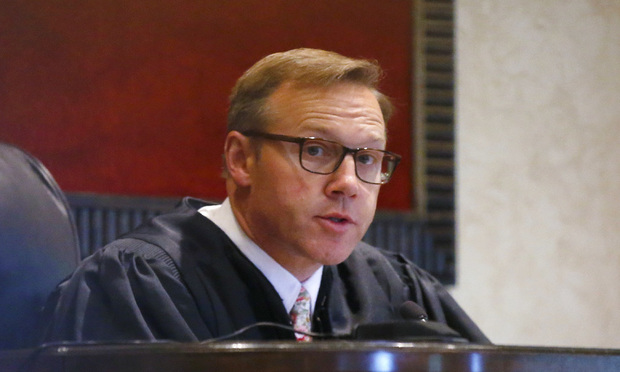J&J Says It Will Appeal $572M Judgment in Okla. Opioid Trial
"The opioid crisis has ravaged the state of Oklahoma. It must be abated immediately," Cleveland County District Court Judge Thad Balkman told a crowded courtroom on Monday, according to coverage by Courtroom View Network.
August 26, 2019 at 05:25 PM
6 minute read
The original version of this story was published on Law.com
 Judge Thad Balkman speaks during Oklahoma's case blaming consumer products giant Johnson & Johnson and its subsidiaries for the state's opioid drug crisis, in Norman, Oklahoma, in July. (AP Photo/Sue Ogrocki, File)
Judge Thad Balkman speaks during Oklahoma's case blaming consumer products giant Johnson & Johnson and its subsidiaries for the state's opioid drug crisis, in Norman, Oklahoma, in July. (AP Photo/Sue Ogrocki, File)
An Oklahoma judge has ordered that Johnson & Johnson pay more than $572 million to abate the state's opioid crisis.
The bench verdict, announced by Cleveland County District Court Judge Thad Balkman on Monday, comes in the first trial against an opioid company. Oklahoma had asked for a $17.5 billion abatement plan over 30 years, alleging that Johnson & Johnson's Janssen Pharmaceuticals, as the sole defendant, created a public nuisance when it oversupplied opiate pharmaceuticals in the state, leading to massive deaths and addictions.
"The opioid crisis has ravaged the state of Oklahoma. It must be abated immediately," Balkman told a crowded courtroom, according to coverage by Courtroom View Network.
He entered a 42-page judgment against Johnson & Johnson and Janssen.
"The opioid crisis is an imminent danger and a menace to Oklahomans," he added. "My judgment includes findings of fact and conclusions of law that the state met its burden that the defendants, Janssen and Johnson & Johnson's misleading marketing and promotion of opioids created a nuisance."
Specifically he said, Johnson & Johnson and Janssen created a nuisance that caused an increased rate of addictions, overdose deaths and addicted babies in Oklahoma.
Johnson & Johnson said it plans to appeal.
"Janssen did not cause the opioid crisis in Oklahoma, and neither the facts nor the law support this outcome," said Michael Ullmann, general counsel of Johnson & Johnson. "We recognize the opioid crisis is a tremendously complex public health issue and we have deep sympathy for everyone affected. We are working with partners to find ways to help those in need."
Lawyers suing opioid manufacturers and distributors, in both state and federal courts across the country, closely watched the trial. An Oct. 21 trial would be the first in the multidistrict litigation before U.S. District Judge Dan Polster, in Cleveland, which now encompasses nearly 2,000 cases, primarily brought by cities and counties, over the opioid crisis.
In its statement, Johnson & Johnson said the decision would have little impact on the upcoming trial in the multidistrict litigation, which names 21 other defendants and additional claims other than public nuisance. "The Company remains open to viable options to resolve these cases, including through settlement," the company said in a press release on Monday.
Lead plaintiffs' attorneys in the multidistrict litigation—Paul Farrell of Greene, Ketchum, Farrell, Bailey & Tweel; Paul Hanly of Simmons Hanly Conroy; and Joseph Rice of Motley Rice—said the decision would strengthen the claims of their clients, including the two Ohio counties preparing for the upcoming trial.
"Today's ruling holding Johnson & Johnson liable for Oklahoma's opioid epidemic serves as another milestone amid the mounting evidence against the opioid pharmaceutical industry who we allege started, fueled, and conspired to create the largest public health crisis of our time," they wrote. "The ruling in favor of the State of Oklahoma's public nuisance claims confirms what communities have been saying for some time: The opioid epidemic significantly interfered with public health. While public nuisance laws differ in every state, this decision is a critical step forward for the more than 2,000 cities, counties, and towns we represent in the consolidation of federal opioid cases."
Lisa Rickard, president of the U.S. Chamber of Commerce's Institute for Legal Reform, said that if an appeals court did not reverse the decision, "almost any industry could be the target of large-scale litigation."
"Today's decision is based on questionable legal claims from an ill-conceived lawsuit that will do little to solve Oklahoma's opioid crisis," she said in a statement. "No one denies the magnitude of the opioid problem in Oklahoma, but letting private lawyers distort the scarcely-used public nuisance theory in hopes of getting a massive settlement isn't the solution."
Jennifer Braceras, director of the Independent Women's Forum's Center for Law & Liberty, also said the decision will not do much to solve the opioid crisis. "The verdict is a victory for taxation by litigation, but it is consumers who will pay the price in the form of higher prices and reduced access to pain medications for patients who need them," she said in a statement.
American Tort Reform Association President Tiger Joyce noted that Oklahoma Attorney General Mike Hunter, a Republican, had joined with 17 other states, in a May 17 amicus brief before the U.S. Court of Appeals for the Ninth Circuit, in opposing the use of public nuisance law to pursue claims over climate change.
"AG Mike Hunter's use of public nuisance law and the judge's decision to let it stand is a major expansion in this area of law," Joyce said in a statement. "We fear that other industries, including Oklahoma's oil and gas producers, may now be vulnerable to public nuisance law's applicability to them with regard to issues like climate change as the state looks for additional funding sources to manage public crises."
The Oklahoma case initially named Purdue Pharma and Teva Pharmaceuticals, along with Janssen. Purdue settled out of the case in March for $270 million. One day before trial, Teva agreed to pay $85 million, leaving Johnson & Johnson as the only defendant at trial.
At the trial, which began May 28 in Norman, Oklahoma, lawyers for the state of Oklahoma argued that Johnson & Johnson's aggressive marketing of its opioids led doctors and hospital staff, and others, to believe the painkillers were not addictive and could be appropriate for pain treatment in the long term. Joining Attorney General Mike Hunter at trial were Brad Beckworth, a partner at Nix Patterson in Austin, Texas, and Michael Burrage and Reggie Whitten, co-founders of Whitten Burrage in Oklahoma City.
Johnson & Johnson's lawyers brought up rampant misuse of its prescription painkillers, which the U.S. Food and Drug Administration has approved. Their products also come with warnings labels, one of several factors influencing decisions by doctors to prescribe opiate painkillers. Larry Ottaway of Oklahoma City's Foliart Huff Ottaway & Bottom, represented Johnson & Johnson.
This content has been archived. It is available through our partners, LexisNexis® and Bloomberg Law.
To view this content, please continue to their sites.
Not a Lexis Subscriber?
Subscribe Now
Not a Bloomberg Law Subscriber?
Subscribe Now
NOT FOR REPRINT
© 2025 ALM Global, LLC, All Rights Reserved. Request academic re-use from www.copyright.com. All other uses, submit a request to [email protected]. For more information visit Asset & Logo Licensing.
You Might Like
View All
Some Thoughts on What It Takes to Connect With Millennial Jurors

Litigators of the Week: A Knockout Blow to Latest FCC Net Neutrality Rules After ‘Loper Bright’
Trending Stories
- 1Parties’ Reservation of Rights Defeats Attempt to Enforce Settlement in Principle
- 2ACC CLO Survey Waves Warning Flags for Boards
- 3States Accuse Trump of Thwarting Court's Funding Restoration Order
- 4Microsoft Becomes Latest Tech Company to Face Claims of Stealing Marketing Commissions From Influencers
- 5Coral Gables Attorney Busted for Stalking Lawyer
Who Got The Work
J. Brugh Lower of Gibbons has entered an appearance for industrial equipment supplier Devco Corporation in a pending trademark infringement lawsuit. The suit, accusing the defendant of selling knock-off Graco products, was filed Dec. 18 in New Jersey District Court by Rivkin Radler on behalf of Graco Inc. and Graco Minnesota. The case, assigned to U.S. District Judge Zahid N. Quraishi, is 3:24-cv-11294, Graco Inc. et al v. Devco Corporation.
Who Got The Work
Rebecca Maller-Stein and Kent A. Yalowitz of Arnold & Porter Kaye Scholer have entered their appearances for Hanaco Venture Capital and its executives, Lior Prosor and David Frankel, in a pending securities lawsuit. The action, filed on Dec. 24 in New York Southern District Court by Zell, Aron & Co. on behalf of Goldeneye Advisors, accuses the defendants of negligently and fraudulently managing the plaintiff's $1 million investment. The case, assigned to U.S. District Judge Vernon S. Broderick, is 1:24-cv-09918, Goldeneye Advisors, LLC v. Hanaco Venture Capital, Ltd. et al.
Who Got The Work
Attorneys from A&O Shearman has stepped in as defense counsel for Toronto-Dominion Bank and other defendants in a pending securities class action. The suit, filed Dec. 11 in New York Southern District Court by Bleichmar Fonti & Auld, accuses the defendants of concealing the bank's 'pervasive' deficiencies in regards to its compliance with the Bank Secrecy Act and the quality of its anti-money laundering controls. The case, assigned to U.S. District Judge Arun Subramanian, is 1:24-cv-09445, Gonzalez v. The Toronto-Dominion Bank et al.
Who Got The Work
Crown Castle International, a Pennsylvania company providing shared communications infrastructure, has turned to Luke D. Wolf of Gordon Rees Scully Mansukhani to fend off a pending breach-of-contract lawsuit. The court action, filed Nov. 25 in Michigan Eastern District Court by Hooper Hathaway PC on behalf of The Town Residences LLC, accuses Crown Castle of failing to transfer approximately $30,000 in utility payments from T-Mobile in breach of a roof-top lease and assignment agreement. The case, assigned to U.S. District Judge Susan K. Declercq, is 2:24-cv-13131, The Town Residences LLC v. T-Mobile US, Inc. et al.
Who Got The Work
Wilfred P. Coronato and Daniel M. Schwartz of McCarter & English have stepped in as defense counsel to Electrolux Home Products Inc. in a pending product liability lawsuit. The court action, filed Nov. 26 in New York Eastern District Court by Poulos Lopiccolo PC and Nagel Rice LLP on behalf of David Stern, alleges that the defendant's refrigerators’ drawers and shelving repeatedly break and fall apart within months after purchase. The case, assigned to U.S. District Judge Joan M. Azrack, is 2:24-cv-08204, Stern v. Electrolux Home Products, Inc.
Featured Firms
Law Offices of Gary Martin Hays & Associates, P.C.
(470) 294-1674
Law Offices of Mark E. Salomone
(857) 444-6468
Smith & Hassler
(713) 739-1250








